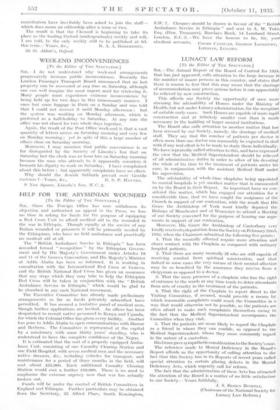LUNACY LAW REFORM
[To the Editor of THE SPECTATOR.] SIR,—The Annual Report of the Board of Control for 1934, that has just appeared, calls attention to the large increase in the number of insane persons in this country, and states that there is reason to fear that this may mean that the shortage of accommodation may prove serious before it can appreciably be relieved by new construction.
This affords our Society the opportunity of once more stressing the advisability of Homes under the Ministry of Health, but not under Lunacy administration, for the reception of suitable early cases. Such Homes arc capable of more rapid construction and at infinitely smaller cost than is made necessary in the building of larger mental institutions.
The Board also calls attention to another matter that has been stressed by our Society, namely, the shortage of medical staff. They say that the number of patients per doctor is often more than one doctor can reasonably be expected to deal with if any real effort is to be made to study them individually. We have repeatedly called attention to this, and have expressed the view that the Medical Superintendent should be relieved of all administrative duties in order to allow of his devoting the whole of his time to the treatment of patients under his care, in conjunction with the assistant Medical Staff under his supervision.
The advisability of whole-time chaplains being appointed to mental hospitals is yet' another matter that is Commented on by the Board in their Report. So important have we con- sidered this matter, which has engaged our attention for a considerable time, that we have sought' the assistance of the Church in support of our contention, with the result that His Grace the Archbishop of York most kindly deputed the Bishops of Manchester and of Worcester to attend a Meeting of our Society convened for the purpose of hearing our argu- ments in support of our contention.
Moreover, His Grace the Archbishop of Canterbury very kindly received a deputation from the Society on February 22nd, 1932, when the Chairman submitted the following five points : 1. That the mentally affected require more attention and • closer contact with the Chaplain as compared with ordinary hospital patients.
2. That there are many mentally ill who are still capable of receiving comfort from spiritual ministration, and that indeed in some cases the very nature of their mental affection may be so benefited by the assurance they receive from a clergyman as opposed to a doctor.
3. That the mere presence of a chaplain who has the right of entrance to the wards at any time tends to deter attendants from acts of cruelty in the treatment of the patients.
4. That the right of the Chaplain to report direct to the Visiting Committee, if secured, would provide a means by which reasonable complaints could reach the Committee in a way that would otherwise not be possible, as the patients are often afraid to make such complaints themselves owing to the fact that the Medical Superintendent accompanies the Committee when they visit.
5. That the patients are more likely to regard the. Chaplain as a friend in whom they can confide, as opposed to the Medical Superintendent, whom they more commonly regard in the nature of a custodian.
His Grace gave sympathetic consideration to the Society's case.
The reference made to Mental Deficiency in the Board's Report affords us the opportunity of calling attention to the fact that this Society has in its Reports of recent years called special attention to certain glaring defects in the Mental Deficiency Acts, which urgently call for reform.
The fact that the administration of these Acts has attracted the attention of the Board is a matter of no little satisfaction to our Society.—Yours faithfully,
J. S. RISIEN RUSSELL. (Chairman of the National Society for . Lunacy Law Reform.)






























































 Previous page
Previous page